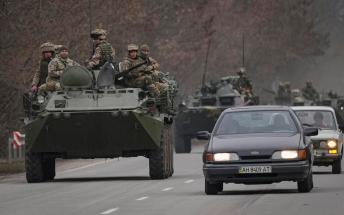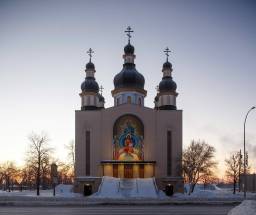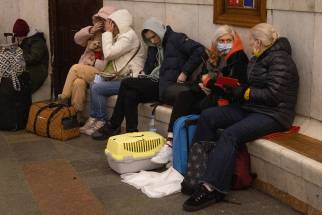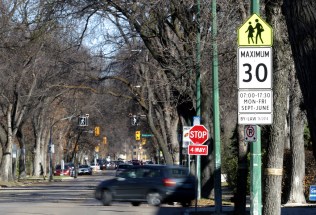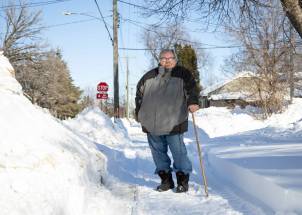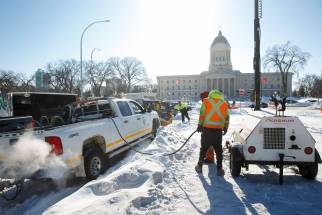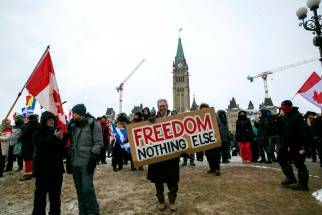Prepping for next test with lessons learned from occupation
Read this article for free:
or
Already have an account? Log in here »
To continue reading, please subscribe:
Monthly Digital Subscription
$0 for the first 4 weeks*
- Enjoy unlimited reading on winnipegfreepress.com
- Read the E-Edition, our digital replica newspaper
- Access News Break, our award-winning app
- Play interactive puzzles
*No charge for 4 weeks then price increases to the regular rate of $19.00 plus GST every four weeks. Offer available to new and qualified returning subscribers only. Cancel any time.
Monthly Digital Subscription
$4.75/week*
- Enjoy unlimited reading on winnipegfreepress.com
- Read the E-Edition, our digital replica newspaper
- Access News Break, our award-winning app
- Play interactive puzzles
*Billed as $19 plus GST every four weeks. Cancel any time.
To continue reading, please subscribe:
Add Free Press access to your Brandon Sun subscription for only an additional
$1 for the first 4 weeks*
*Your next subscription payment will increase by $1.00 and you will be charged $16.99 plus GST for four weeks. After four weeks, your payment will increase to $23.99 plus GST every four weeks.
Read unlimited articles for free today:
or
Already have an account? Log in here »
Hey there, time traveller!
This article was published 24/02/2022 (1383 days ago), so information in it may no longer be current.
Now that the illegal occupation in front of the Manitoba Legislative Building and the blockade at the Emerson border crossing are over, there are at least two questions policy makers must answer: how do they prevent such events from happening again and, if they do occur, how should they be dealt with?
Protests are an important part of a healthy democracy. Not only do Canadians have the constitutional right to demonstrate and express their views, they’re encouraged to do so.
However, those rights are not open-ended. They are subject to reasonable limits in Canada’s Charter of Rights and Freedoms.
They do not include the right to interfere with the freedoms of others, such as blocking roads, paralyzing neighbourhoods, harassing people, assaulting journalists or disturbing the peace for extended periods of time. That is not peaceful assembly, that’s intimidation and anarchy — the kind we saw during the occupation of downtown Ottawa, and to a lesser extent in Winnipeg.

What happened on Memorial Boulevard in front of the legislative building over the past three weeks was not a peaceful assembly. It was an occupation.
A busy roadway was blocked and traffic along Broadway was slowed. There were more than 150 noise complaints made to police, driven by air horns and incessant honking. Large vehicles and other structures, including trailers, light fixtures and two generators, were stationed along Memorial Boulevard.
Vehicles don’t have charter rights. No one has the “right” to park semi-trailers and tractors in the middle of public roads and occupy neighbourhoods. Blasting air horns is not freedom of expression. Police have every right by law to remove those who illegally occupy a neighbourhood.
Vehicles don’t have charter rights. No one has the “right” to park semi-trailers and tractors in the middle of public roads and occupy neighbourhoods.
In the case of Memorial Boulevard (and Ottawa), it wasn’t that simple, owing to the use of large vehicles.
Winnipeg police could have cleared the area on the first day of the occupation, but the risk of violence would have been high. Mass arrests would have likely resulted in significant injury; forcibly removing large trucks and tractors was problematic.
The goal for police was to avoid violence using diplomacy and de-escalation techniques, including communication and negotiation, in an attempt to bring the occupation to a peaceful ending. That was achieved.
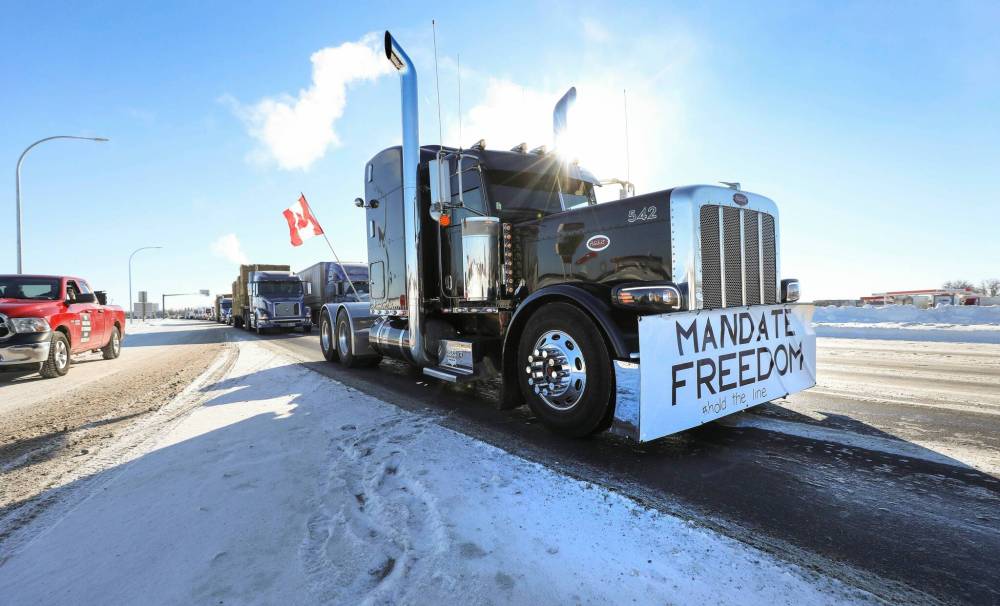
There were no injuries (with the exception of four people in a hit-and-run on Broadway by a motorist whose actions were not connected to the occupation) and no property damage.
It was a master class on how to safely and effectively manage a hostile occupation.
However, these unlawful acts can’t become the new normal. We can’t have people taking over neighbourhoods and blocking roadways with large vehicles and campers every time they don’t like something government does. That’s not democracy, that’s anarchy.
It’s an issue elected officials will have to tackle in the coming months, in consultation with law enforcement and possibly with input from an independent third party, such as a commission or an outside review.
There are legislative and other options available, including the use of financial and insurance instruments (freezing bank accounts, cancelling vehicle insurance policies or taking other administrative actions against occupiers) that could be used without invoking emergency legislation. Such measures would have to be balanced with people’s charter rights, such as freedom of expression and peaceful assembly.
There are legislative and other options available, including the use of financial and insurance instruments (freezing bank accounts, cancelling vehicle insurance policies or taking other administrative actions against occupiers) that could be used without invoking emergency legislation.
The alternative, allowing prolonged occupations like the one on Memorial Boulevard, to become the new normal is not an option.
Those involved have discovered a new way of drawing attention to a cause: occupying urban areas with large vehicles police can’t easily remove. It’s a new tactic authorities have to assume will be used again, whether pandemic related or for some other issue. The next so-called “freedom convoy” could be a protest against gun control laws or measures to combat climate change.
Governments have to be prepared. Elected officials from all political parties should unite and stand up for law and order to prevent small groups from holding the rest of society hostage.
The majority won’t, and shouldn’t, tolerate this kind of anarchy.
tom.brodbeck@freepress.mb.ca


Tom has been covering Manitoba politics since the early 1990s and joined the Winnipeg Free Press news team in 2019.
Our newsroom depends on a growing audience of readers to power our journalism. If you are not a paid reader, please consider becoming a subscriber.
Our newsroom depends on its audience of readers to power our journalism. Thank you for your support.




